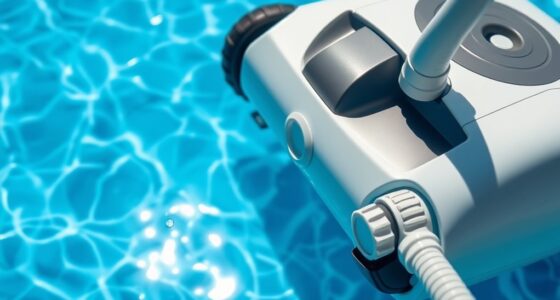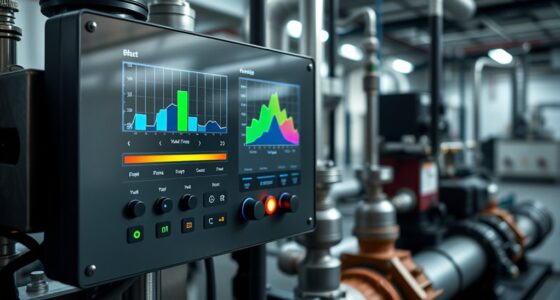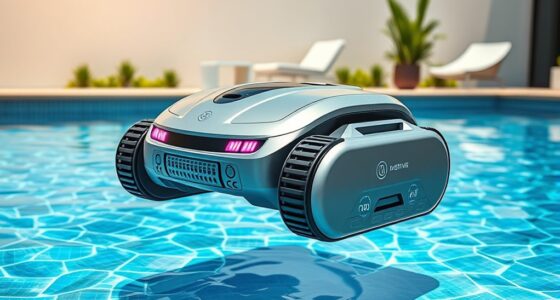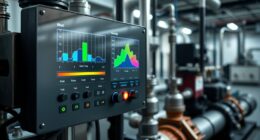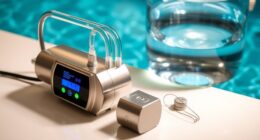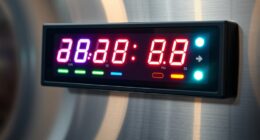Pressure pool cleaners are still relevant because they offer an affordable and durable way to handle large or uneven pools. They effectively remove tough debris using high-pressure jets, requiring minimal automation but some manual oversight. While they have limitations like difficulty reaching tight spots or corners, they remain a practical choice for many pool owners. To discover how they compare with newer options and find the best solution, explore further details outlined below.
Key Takeaways
- Pressure pool cleaners effectively handle large debris and uneven surfaces, complementing other cleaning methods.
- They require manual operation and supervision, limiting their efficiency in tight corners and complex pool layouts.
- Modern models are durable, energy-efficient, and customizable, maintaining their relevance for specific cleaning needs.
- They are cost-effective long-term, reducing manual labor and maintenance costs despite higher initial investments.
- Despite advances in robotic cleaners, pressure cleaners remain useful for targeted, large debris removal and routine maintenance.
How Do Pressure Pool Cleaners Work?
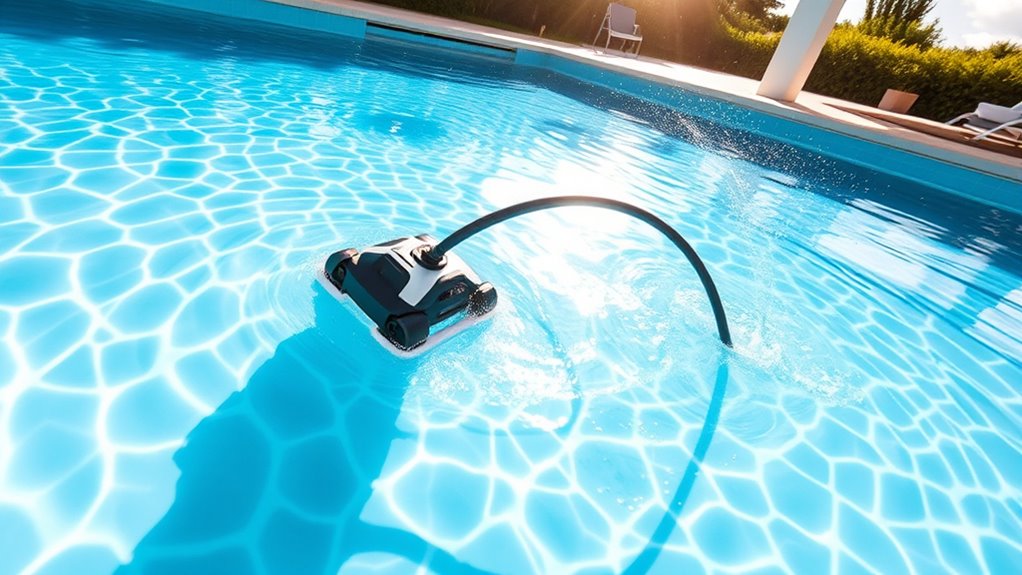
Pressure pool cleaners operate by using high-pressure water jets to move and scrub the pool’s surfaces. You typically control them through manual operation, attaching the cleaner to a hose and a dedicated skimmer or vacuum port. Once connected, water flow from your pool’s pump powers the cleaner, creating the necessary force to propel it around the pool. The high-pressure water jets push against the surfaces, breaking loose dirt and debris as the cleaner moves. As water flows through the device, it generates the movement and scrubbing action needed for cleaning. You can often adjust the water flow to control the cleaner’s speed and effectiveness. Overall, the water flow is essential, powering the device and enabling it to navigate and clean your pool efficiently. Modern pressure pool cleaners can also be customized with different nozzle configurations to optimize cleaning performance. Additionally, advancements in technology have improved their efficiency and ease of use. A well-designed water flow system can significantly enhance the cleaner’s overall performance and reliability.
Advantages of Using Pressure Pool Cleaners
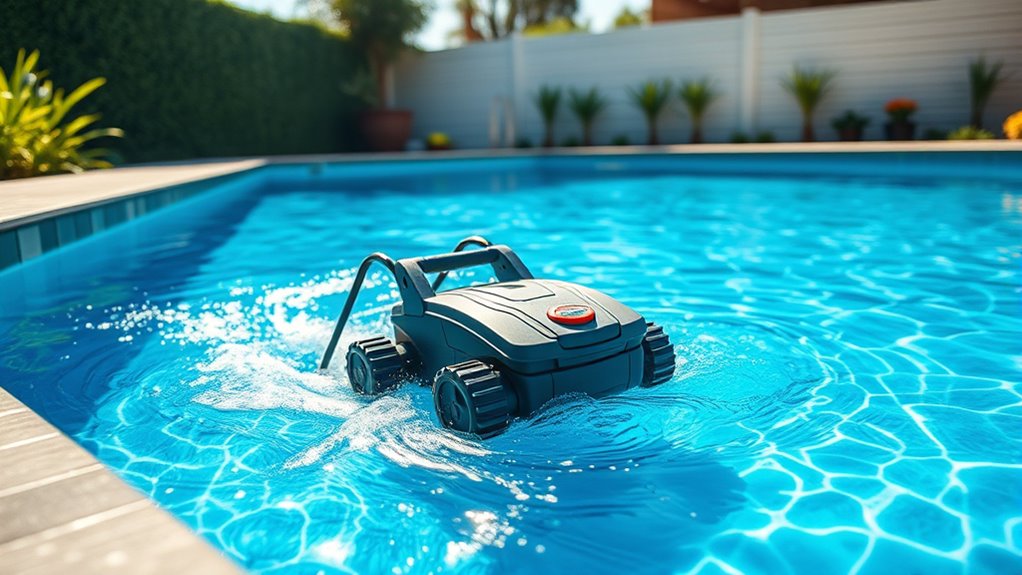
One of the main advantages of using pressure pool cleaners is their efficiency in cleaning large and uneven pool surfaces. They provide thorough coverage, reaching areas that robotic cleaners might miss. These cleaners are designed for energy efficiency, consuming less power while still delivering effective cleaning. Their simple design means you don’t have to worry about complex programming or setups, making them easy to use. You can quickly connect them to your pool’s existing pump system and let them do the work. Plus, pressure cleaners are durable, capable of handling tough dirt and debris without frequent maintenance. Additionally, understanding Mazda Tuning can help you optimize vehicle performance, similar to how selecting the right pool cleaner enhances your pool maintenance. Overall, their combination of energy efficiency and ease of use makes them a practical choice for maintaining a clean, inviting pool with minimal effort.
Limitations and Drawbacks of Pressure Cleaners
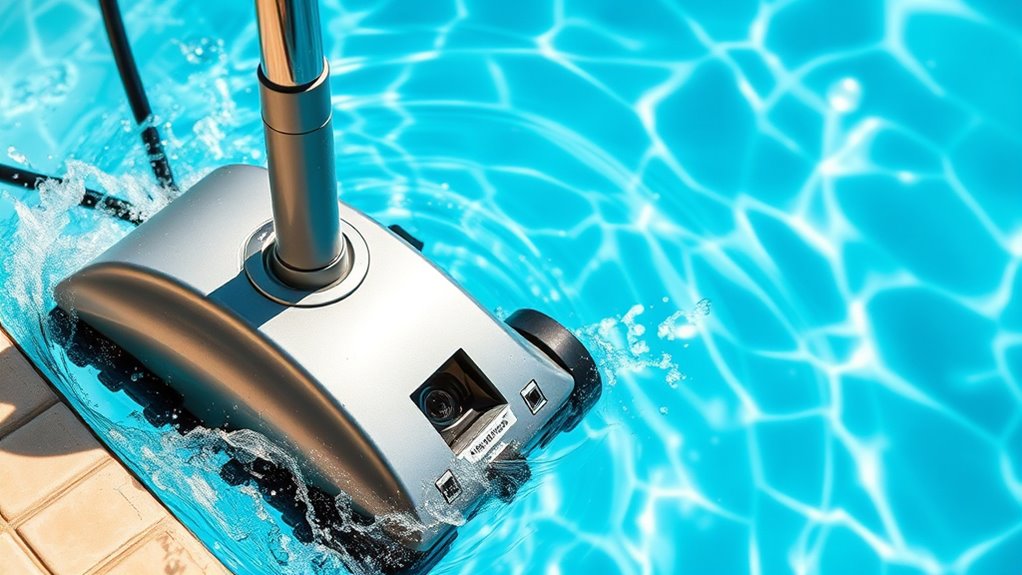
While pressure pool cleaners excel in many areas, they also have certain limitations you should consider. One major drawback is their reliance on manual operation, which means you need to set them up and monitor progress regularly. Additionally, they have a limited reach, making it difficult to clean corners or uneven surfaces thoroughly. The table below highlights common limitations:
| Limitation | Impact |
|---|---|
| Manual operation | Requires user setup and supervision |
| Limited reach | Struggles with corners and tight spots |
| Inability to navigate obstacles | Gets stuck or misses debris around obstacles |
| No autonomous cleaning | Needs constant human intervention |
| Less effective on textured surfaces | May miss dirt on rough pools |
These factors can reduce efficiency and increase maintenance time, making pressure cleaners less ideal for some pool owners. For more efficient cleaning, considering advanced technology options may be worthwhile, especially as AI-powered solutions continue to improve cleaning capabilities. Furthermore, ongoing innovations in robotic pool cleaners are addressing many of these limitations, offering more autonomous and comprehensive cleaning options. Additionally, the development of smart features is helping to mitigate some of the operational challenges faced by traditional pressure cleaners. It is also important to note that the effectiveness of pressure cleaners can vary depending on the surface type of your pool, which can influence their overall performance.
Comparing Pressure Cleaners With Robotic Alternatives
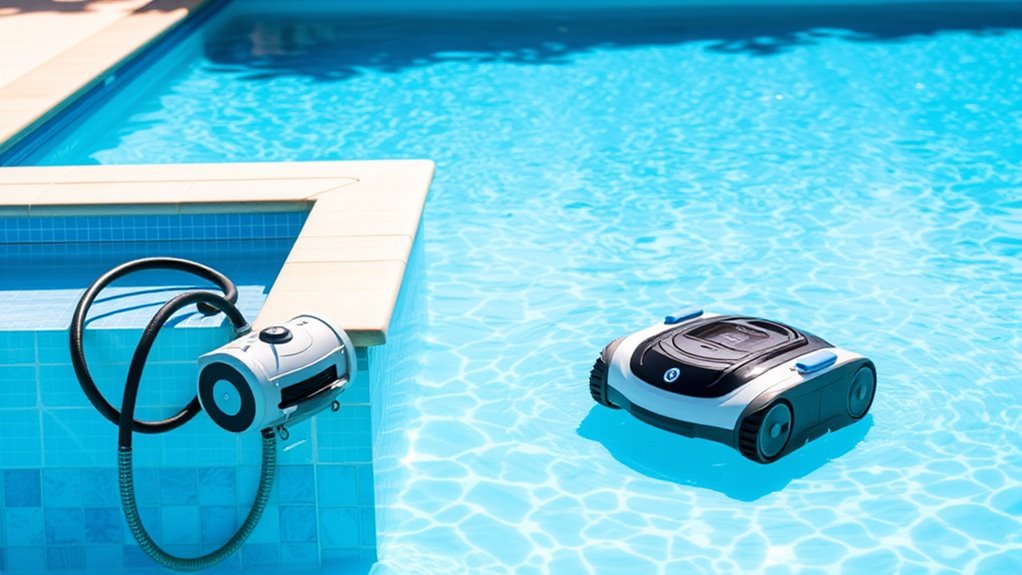
Robotic pool cleaners have become a popular alternative because they require less manual intervention and often cover more ground efficiently. Unlike pressure cleaners, which rely on direct manual operation and can sometimes miss spots, robotic cleaners navigate the pool autonomously, ensuring thorough coverage. They also handle chemical cleaning better, as they often have customizable settings to optimize water circulation and chemical distribution. With robotic cleaners, you don’t have to spend time guiding the device or adjusting hoses, freeing you up for other tasks. This efficiency makes them appealing for pool owners seeking a low-maintenance option. Additionally, many robotic models are designed with energy-efficient features that help reduce overall power consumption during operation. As technology advances, these automated cleaning systems continue to improve their performance and user convenience. Moreover, some models are equipped with smart navigation capabilities that allow for even more comprehensive cleaning patterns. As these devices become more advanced, their reliability and ability to adapt to different pool shapes have greatly increased, making them a viable alternative to traditional pressure cleaners. Furthermore, ongoing innovations in sensor technology have enabled robotic cleaners to better detect obstacles and optimize their cleaning routes for maximum efficiency.
Cost and Maintenance Considerations
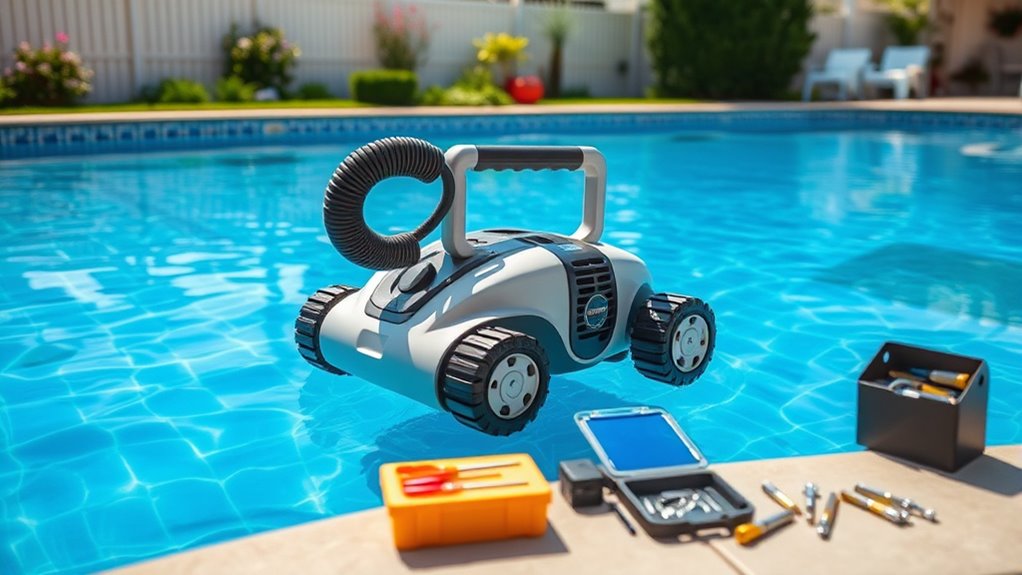
When choosing a pressure pool cleaner, you’ll want to contemplate both the initial costs and ongoing expenses. The upfront investment can vary depending on the model, and maintenance bills add up over time. Understanding these costs helps you make a smarter, more budget-friendly decision. Additionally, considering maintenance requirements can extend the lifespan of your cleaner and improve its efficiency. Regularly inspecting and cleaning your pressure pool cleaner can prevent costly repairs and ensure optimal performance over its service life. Being aware of potential trust issues or recurring problems with equipment can also guide you toward more reliable models that require less frequent repairs. Properly selecting the right model based on your pool’s size and usage can further reduce long-term costs and maintenance needs. Incorporating routine upkeep into your maintenance plan can significantly enhance the cleaner’s durability and performance.
Upfront Investment Costs
Investing in a pressure pool cleaner requires a significant upfront cost, but it can lead to long-term savings through reduced maintenance and energy use. The initial investment might seem steep compared to manual cleaning tools, but it often pays off over time. When considering long-term affordability, factor in the durability and efficiency of the unit, which can minimize future expenses. Higher-quality pressure cleaners tend to have better warranties and longer lifespans, making them a smart financial choice. While the initial price may be higher, the convenience and reduced need for frequent manual cleaning can justify the cost. Additionally, choosing a unit with proven performance and reliability can further enhance long-term savings. Proper maintenance and selecting a model with energy-efficient features can also contribute to ongoing cost reductions. Incorporating effective cleaning mechanisms that adapt to different pool sizes and types can enhance overall efficiency. Ultimately, a well-chosen pressure pool cleaner offers a balance between upfront expenditure and ongoing savings.
Ongoing Maintenance Expenses
Although the initial cost of a pressure pool cleaner can be substantial, it’s important to contemplate the ongoing expenses involved in maintaining it. You’ll need to regularly check your pool’s chemical balance to prevent algae and corrosion, which can increase maintenance costs. Additionally, energy consumption adds to expenses, as pressure cleaners use power during operation. Proper upkeep involves replacing filters and inspecting hoses, which can add up over time. Consider this table for potential costs:
| Maintenance Task | Estimated Cost |
|---|---|
| Chemical balancing | $20–$50/month |
| Filter replacements | $10–$30 per replacement |
| Energy usage | $0.10–$0.20 per hour |
Staying on top of these factors ensures your cleaner runs efficiently and prolongs its lifespan.
Are Pressure Cleaners Still a Practical Choice?
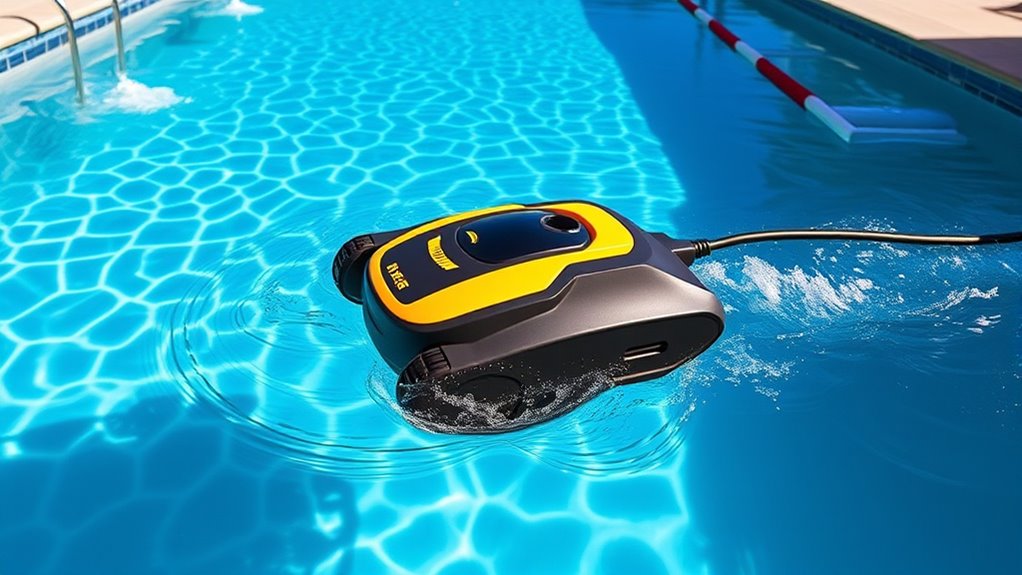
Are pressure pool cleaners still a practical choice for maintaining your pool today? It depends on your cleaning routine. While manual cleaning allows you to target stubborn dirt and debris directly, it can be time-consuming. Chemical treatment keeps your pool sanitized but doesn’t remove debris, so you need an effective way to clear the water surface. Pressure cleaners automate this process, saving you effort and ensuring consistent cleaning. They excel at removing larger debris and reducing the workload of manual cleaning, especially in pools with heavy debris. However, they might not reach every corner or fine particles, so combining them with manual cleaning and proper chemical treatment remains essential for a spotless, healthy pool. Overall, pressure cleaners still hold value for efficient maintenance.
Making the Right Decision for Your Pool Care
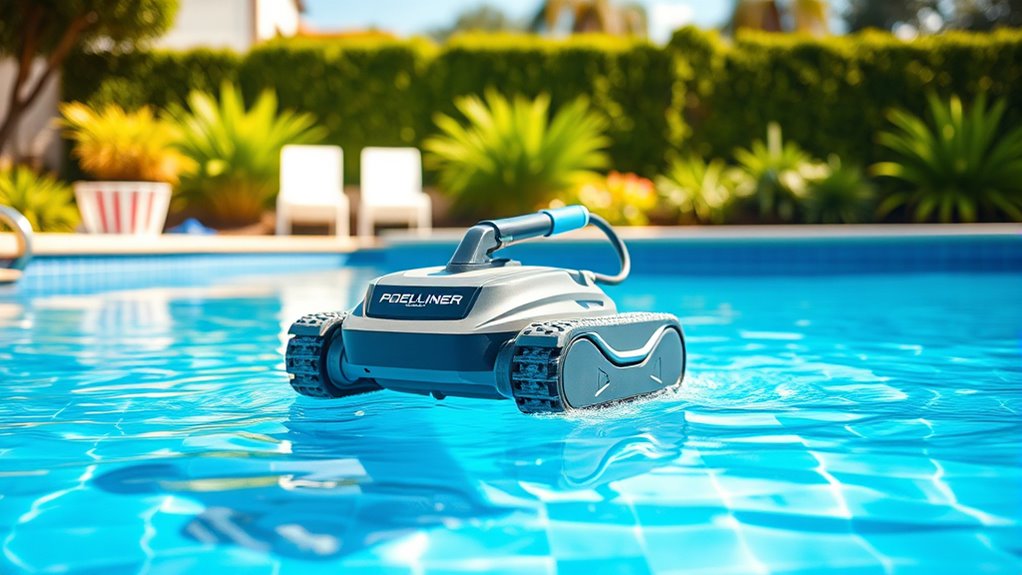
Choosing the right pool cleaning method depends on your specific needs, budget, and maintenance routine. Consider how technological obsolescence might influence your choice—opting for outdated equipment could lead to inefficiency or higher costs over time. Pressure pool cleaners offer convenience but may become obsolete as new technologies emerge, so weigh their longevity. Also, think about the environmental impact; some cleaners use more water or energy, increasing your ecological footprint. Modern options often prioritize energy efficiency and eco-friendliness, making them more sustainable choices. By evaluating these factors, you can select a pool care solution that balances effectiveness, cost, and environmental responsibility. Making an informed decision ensures your pool stays clean while aligning with your values and long-term needs.
Frequently Asked Questions
How Do Pressure Pool Cleaners Compare to Manual Skimming?
Pressure pool cleaners are generally more efficient than manual skimming because they cover larger areas quickly, thanks to their robot efficiency. You’ll find they require less effort on your part, though maintenance costs can add up over time. Manual skimming, while cheaper initially, demands more time and effort, making pressure cleaners a convenient, time-saving choice for keeping your pool clean effortlessly.
What Types of Debris Can Pressure Cleaners Effectively Remove?
Pressure pool cleaners effectively remove various debris types, including leaves, twigs, and dirt, making leaf removal easier and quicker. They also help with algae control by scrubbing surfaces and circulating water, reducing algae buildup. You’ll find these cleaners especially useful for maintaining a clean, healthy pool, as they reach difficult spots and ensure thorough debris removal, saving you time and effort compared to manual cleaning methods.
Are Pressure Pool Cleaners Suitable for All Pool Sizes?
Like a skilled gardener tending varied plants, pressure pool cleaners adapt well to different pool sizes. They’re generally suitable for most pool sizes, but you should check compatibility to guarantee peak performance. These cleaners are energy-efficient, saving you money while maintaining cleanliness. For larger pools, they might need more time or higher pressure settings, but overall, they’re a reliable choice for keeping your pool pristine without wasting energy.
How Long Do Pressure Pool Cleaners Typically Last?
Pressure pool cleaners typically last around 3 to 5 years, depending on maintenance frequency and usage. To extend their lifespan, you should regularly check and clean the filter and hoses. They’re cost-effective over time, especially if you maintain them properly, saving you money on professional cleaning. Proper care ensures your pressure cleaner works efficiently and lasts longer, making it a smart investment for keeping your pool spotless.
Can Pressure Cleaners Be Used With Saltwater Pools?
You can definitely use pressure pool cleaners with saltwater pools, but check for saltwater compatibility and corrosion resistance first. Look for models specifically designed to handle saltwater, as they feature corrosion-resistant materials that won’t rust or degrade over time. Using a compatible cleaner guarantees effective cleaning without damaging your equipment, keeping your pool pristine and extending the lifespan of your pressure cleaner.
Conclusion
So, are pressure pool cleaners still relevant? It depends on your needs and budget. While they’re reliable and straightforward, robotic cleaners offer more convenience and efficiency. Ultimately, your choice hinges on balancing cost, maintenance, and how hands-on you want to be. Whether you stick with pressure cleaners or explore newer options, just remember, the right tool makes pool cleaning a little easier—coincidence or not, it’s all about finding what works best for you.


